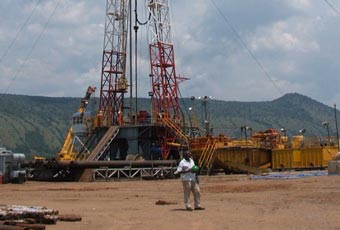
By James Herron
After remarkable exploration success in Uganda, Tullow Oil PLC (TLW.LN) and Heritage Oil Ltd. (HOIL.LN) face tough choices over how to develop the oil they’ve discovered.
Both companies face immense infrastructure challenges bringing the oil from its remote region to world markets. They have to walk a fine line between their commercial goals and the sometimes conflicting ambitions of the Ugandan government. Tullow and Heritage also have to handle overtures from much larger rivals that want in on the substantial quantities of oil they have discovered.
Until this week, when the first well in the region came up dry, Tullow and Heritage drilled 15 wells in the Lake Albert basin of Uganda with a 100% success rate. Reserves in the area now stand at 600 million barrels of oil equivalent, said Tullow Chief Executive Aidan Heavey.
‘Lake Albert is a multibillion-barrel basin,’ with great potential to expand reserves even further once problems with licenses on the Congolese side of the lake are resolved and exploration begins there, said Paul Atherton, chief financial officer of Heritage.
Regardless of all the challenges they face, the owners of Tullow and Heritage have been well rewarded for their Ugandan drilling success. It has contributed to a more than doubling in Heritage’s share price since the beginning of the year and a rise in Tullow of almost 50%.
Differing goals

However, things are getting a lot more complicated for them, said NCB Stockbrokers analyst Peter Hutton. As thoughts turn from exploration to development, a significant gap has emerged between the Ugandan government’s intentions and those of Heritage and Tullow, he said.
Tullow and Heritage have long talked of exporting the Lake Albert oil to world markets via Kenya, initially by rail to the port of Mombassa and eventually through a large enough pipeline to carry the 150,000 barrels of oil per day the basin is thought to be capable of producing.
The government has clashed recently with Tullow over the pipeline, said an official at the energy and minerals ministry.
And Uganda’s energy minister recently said no unrefined oil should be exported from Uganda and instead the country should build a refinery to process all domestic crude and supply oil products to the whole region.
It isn’t yet clear how serious the government is about building a major refinery. Ben Twado, the commissioner in charge of petroleum supplies, said it is stepping up efforts to secure funds and partners for a facility that would initially process about 4,000-5,000 barrels a day, but be able to expand and handle all production in five to seven years.
A person familiar with the matter said the government is saying one thing in private talks with the companies and another in its public statements. And a refinery large enough to process all Ugandan crude is unlikely to happen, the person said.

Tullow’s chief operating officer, Paul McDade, said nothing is set in stone. ‘The Ugandan authorities are not really clear themselves on what is required,’ and there are significant technical challenges, he said.
‘To make (a refinery) commercially viable we are talking hundreds of thousands of barrels a day,’ McDade said. That is far more than Uganda and its neighbors currently consume, he said.
However, McDade acknowledged Uganda’s strong desire to be less dependent on imported oil products and that Heritage and Tullow will meet their goals in Uganda only if they, ‘achieve the targets and objectives of the government also.’
Pipeline And Partnership
Even if the Ugandan government eventually decides that refining all oil domestically isn’t the best option, significant hurdles remain for Heritage and Tullow as they try to take full advantage of Lake Albert.
Getting 150,000 barrels of oil a day to world markets would require a 1,200-kilometer pipeline. The waxy nature of the crude adds to the challenge, probably requiring a combination of chemical treatment and heating to keep the oil flowing.
These aren’t insurmountable technical challenges, but the size and expense of the project would put a tremendous strain on companies as small as Tullow and Heritage, said Tullow’s McDade.
‘Do we see ourselves as the best people to put in a 1,200-kilometer pipeline? Not really,’ said McDade.
Once major exploration work is complete, Tullow plans to sell part of its stake in the fields to ‘a partner that brings competency to the table, with demonstrable experience of building a long pipeline and doing it efficiently,’ he said.
Several Chinese and major international oil companies have shown an interest in cooperating in Uganda, said Tullow CEO Heavey. Heritage has also had early stage talks about the development with a number of engineering consortiums that have access to finance, Atherton said.
When Tullow does eventually find a partner, it is likely that Heritage will also sell all or part of its stake, said analysts.
Any new entrant ‘will want to look at the whole project,’ and a triangular negotiation involving Heritage, Tullow and a buyer would make the most sense for all concerned, said NCB’s Hutton.
Heritage may be keener than Tullow to get the cash, said Evolution Securities analyst Richard Griffith. It can develop recent oil discoveries in Kurdistan much more quickly than Uganda because ‘the export line is already built.’ The Kurdistan development could be accelerated by reinvesting the proceeds of a Ugandan asset sale, Griffith said.
Atherton declined to comment on this speculation, but added that ‘Heritage has the capability as a company to look at two core areas.’
Local Concerns
As talks on the development move slowly forward, one voice that has been heard little so far is that of the local communities, said Dickens Kamugisha, chief executive of the African Institute for Energy Governance, a non-governmental organization based in the Ugandan capital.
Local people are worried about the problems caused in Nigeria, Angola and Chad by the exploitation of oil resources and unchecked flows of petrodollars to governments with a reputation for corruption, he said. ‘The process has been secretive,’ with insufficient public discussion over the competing development plans and no publication of the production-sharing contracts between the Ugandan government and the companies, he said.
Tullow and Heritage stressed that they have maintained good relationships with local communities. Tullow said it has shown local people around their drill sites to explain what they are doing and both companies are contributing to local development by funding schools, health clinics and even lifeboat training on the lake. Employment of local people ‘would be an integral part of any development plan,’ along the lines of work the company has done in Ghana, said McDade.
Kamugisha acknowledged the local work of the companies, but expressed concern about the lack of transparency from the government. He said he wants the Ugandan government to follow the principles of the Extractive Industries Transparency Initiative and declare all oil revenues openly in order to prevent corruption. Both Tullow and Heritage said they are happy to disclose the terms of their contracts – which they described as containing good terms for Uganda – if the government allows it.
Whether this is enough is unclear. A dispute is already brewing over who controls rights to minerals in the Lake Albert area and how revenues will be distributed between the government and leaders of the Bunyoro Kingdom – the ethnic grouping that occupies districts on the lake’s eastern shore . Local communities ‘say they have been completely left out of the process and are not satisfied,’ said Kamugisha.
From the Dow Jones Newswire
 The Independent Uganda: You get the Truth we Pay the Price
The Independent Uganda: You get the Truth we Pay the Price


